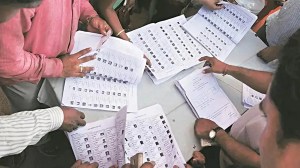Amrita Padma Vibhushan Forgotten Pritam
Rashtrapati Bhavan or even the Union Home Ministry is not even a 30-minute ride from her Hauz Khas home. But five days after she was awarded...

Rashtrapati Bhavan or even the Union Home Ministry is not even a 30-minute ride from her Hauz Khas home. But five days after she was awarded the country’s second highest civilian honour, writer and poet Amrita Pritam, too ill at 85 to stir out, has still not received the Padma Vibhushan: the government decided to send her the award by post.
A card arrived yesterday with a ‘‘wish you a speedy recovery’’ from Prime Minister Manmohan Singh. He wanted to speak to her but was told that she was in no shape to talk. She’s not even aware of the honour that has been bestowed on her.
Her companion Imroz, always by her bedside, says ‘‘each day she reminds me to get cyanide but I tell her isme milawat hai (it’s adulterated), you won’t die… there’s a law against mercy killing, I am helpless.’’
Imroz is disappointed that no one has bothered to personally honour his muse. ‘‘But she does’t care. She is happy the way she is.’’
According to Rashtrapati Bhavan sources, the President of India honours awardees after their presence is confirmed by the Home Ministry. It’s the Home Ministry that scrutinises the awardees before the President invites them to the Rashtrapati Bhavan on a designated date.
But the cold bureaucratic communication bothers Imroz as he surrounds himself with memories and photographs of his companion and recalls their association.
They have lived in this double-storeyed house for years, built from the Sahitya Akademi prize money. She was the first woman writer to receive the prize in 1956.
‘‘We bought the land from the prize money of Rs 5,000,’’ says Imroz. The Jnanpith award came in 1982.
Left to himself, Imroz is willing to bid her goodbye as he strokes her head, willing her to sleep. Her contemporaries seem to have forgotten her.
‘‘Writers and artists are vain people,’’ says Imroz, adding ‘‘you know, we never said I love you even once.’’



- 01
- 02
- 03
- 04
- 05




























